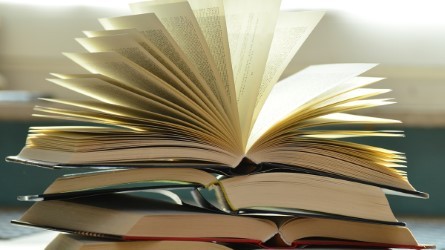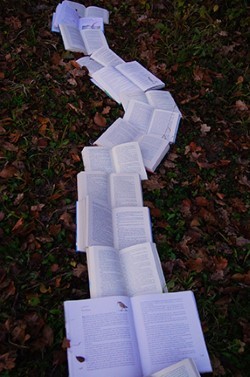What Should You Be Reading in Quarantine?
We asked members of the Columbia faculty to recommend books that are transportive and transformative.

You’re hunkered down at home, and you need a break from the constant pandemic chatter filling your head. If you’re looking for reading recommendations that will lift the spirits and offer food for thought, we’ve got you covered. Check out these suggestions from professors of literature, writing, film, theater and visual arts.
The Bible
As quarantine reading, the Bible has several qualities to recommend it. First, you likely have a physical copy somewhere in your house, which means that you don’t have to buy anything from Amazon or spend yet another hour reading from a screen. Second, unless you belong to a Bible study group—or even if you do—there are probably large portions that you’ve never read. The Apocrypha (or deuterocanonical books) alone are enough to keep you occupied for days. I started with the Book of Tobit because I have an old picture on my wall, inherited from my grandparents, that I felt pretty sure represented the story of Tobit—pretty sure, but not entirely, because I’d never gotten around to reading it. When I did, I wasn’t disappointed. I won’t offer any spoilers except to mention that it includes a very nice dog. Not one with much of a personality, or even much of a role in the plot. But, the sad fact is that there are few good dogs in Scripture. When dogs are mentioned, they tend to be either figurative (and not in a flattering way) or else occupied in licking up the blood of an evil king. So, featuring a good—indeed, angelic—dog is a resounding recommendation for Tobit.
—Erik Gray, Professor of English and Comparative Literature
History, Fantasy, Poetry
I'm taking the opportunity to read a brand new novel, Empire City, by a School of the Arts MFA alum and former student of mine, Matt Gallagher. It's an alternate-history novel in the vein of Philip Roth's The Plot Against America, this time about an America that won the Vietnam War and then began doing experiments on its soldiers to create super-powered combatants, only to find those experiments going wildly wrong.
—Victor LaValle, Professor of Writing, School of the Arts
I’ve just started The Old Drift, a fantasia-epic of a novel by the Zambian writer Namwali Serpell. Last week, I sent a pal who wanted to read Dickens to Our Mutual Friend. I may go back to it myself or to Bleak House. I’m also reading a lot of poetry, just plucking books off the shelf (a jazz poems anthology, Emily Dickinson, my colleague Deborah Paredez). Whatever the century, country or form, let it quicken your senses and stir your soul. Finally, don’t be ashamed of escapist genre reading! Thrillers (I’m collecting recommendations from friends), sci-fi, rom-com: indulge and enjoy yourself.
—Margo Jefferson, Professor of Writing, School of the Arts
Social Justice and the Magic of Making Art

Pleasure Activism: The Politics of Feeling Good by Adrienne Maree Brown is a collection of interviews and essays about healing and happiness, including an annotated version of Audre Lorde's seminal essay, "The Uses of the Erotic: The Erotic is Power.” Brown rejects the notion that social justice is another form of work. I am reading this book now because the pandemic is forcing us to collectively think about and practice social justice and healing through such issues as disability rights, prison reform, domestic violence, poverty, healthcare, economic disparity and internet access for remote learning. Crises can expedite processes: Things we used to think were impossible are now happening all over the world. Policy changes as a result of the pandemic can go either way, and we’re all in it—thinking, feeling, doing, wanting to do! Reading Pleasure Activism can carve out space in the overall anxiety for an optimistic perspective that considers healing, pleasure and the importance of social justice.
—Tamar Ettun, Adjunct Professor of Visual Arts, School of the Arts
Frederic Tuten's My Young Life: A Memoir should be required reading for all MFA students and faculty. Tuten, who wanted to be a painter in his youth, is a cult figure in the avant-garde writing world. He writes of a lost New York, one that is far enough away to be utterly fresh and romantic; of a time before the "professionalization" of our various fields interrupted the practice of artists and writers with its rigors and banalities; and of the very visceral desire to make art regardless of the hurdles.
—Ira Silverberg, Adjunct Professor of Writing, School of the Arts
Matisse, Fiction
I suggest Hilary Spurling’s The Unknown Matisse, Elaine Scarry’s On Beauty and Being Just, Janet H. Murray’s Hamlet on the Holodeck: The Future of Narrative in Cyberspace and anything about Nancy Spero’s Paper Mirror, a retrospective of her work that took place at the Museum of Modern Art’s PS1 in 2019.
—Gina Beavers, Adjunct Professor of Visual Arts, School of the Arts
I am currently reading American Dirt by Jeanine Cummins, and I plan to read: The Relationship is the Project: Working with Communities, a resource for emerging practitioners, artists and cultural workers on how to better engage with community-based projects; Radical Dharma: Talking Race, Love and Liberation by Angel Kyodo Williams, Lama Rod Owens and Jasmine Sydullah; Decolonizing Wealth: Indigenous Wisdom to Heal Divides and Restore Balance by Edgar Villanueva and Diversity, Inc.: The Failed Promise of a Billion-Dollar Business by Pamela Newkirk.
—Donna Walker-Kuhne, Adjunct Professor of Theatre, School of the Arts
I've restarted Milkman by Anna Burns, a brilliant book I hadn't finished because in normal life I wasn't prioritizing reading for personal pleasure. Now it's a high priority to carve out that time. This novel is gorgeous—energetic, funny, with an intricate structure I'm totally and willingly sucked into (then I step out to admire it every so often), vivid characters, a subtle and powerful portrait of life in Northern Ireland.
—Katherine Loewald, Adjunct Professor of Theatre, School of the Arts
Joyful Seclusion
While social distancing, I've been increasingly thinking of novels about isolation, and especially those where the seclusion is productive or even joyful: Hernan Diaz's brilliant In the Distance (a Pulitzer finalist); Tove Jansson's calming The Summer Book, about a young girl and her grandmother on a tiny island; Knut Hamsun's Pan. On a less joyful, but chillingly resonant level: Octavia Butler's Parable of the Sower and Kobo Abe's The Woman in the Dunes. Next up, I plan to take a break from virtual Zoom hangouts to reread Adolfo Bioy Casares's The Invention of Morel.
—Lincoln Michel, Adjunct Professor of Writing, School of the Arts
I am currently reading The Musical Brain: and Other Stories by César Aira.
—Ben Hagari, Adjunct Professor of Visual Arts, School of the Arts
Time for reading these past weeks has been hard to come by, but should the chance present itself to settle in with a good book, I might revisit an old favorite, Robert K. Massie’s Peter the Great, His Life and World. A saga to transport you to another world, it’s a fascinating psychological study, a compelling adventure tale and an absorbing account of the opening of Russia to the West.
—Gigi Bolt, Adjunct Professor of Theatre, School of the Arts
From Trees to Film
The Overstory by Richard Powers, which is a remarkable, exquisitely written reminder of our interconnectivity, not only to each other as humans, but to the trees that surround us. Also, The Splendid and the Vile by Erik Larson, about how Churchill managed to keep himself, his family and his nation calm during a time of great strife.
—Michele Volansky, Adjunct Professor of Theatre, School of the Arts
All of these books offer nice talking points for the lecture portion of my remote classes: The Film Director’s Intuition by Judith Weston, Acting, Imaging and the Unconscious by Eric Morris and The Actor’s Art and Craft by William Esper and Damon Dimarco.
—Lisa Milinazzo, Adjunct Professor of Film, School of the Arts
I recommend El Topo, A Book of the Film by Alexandro Jodorowsky. Some of us might be busier than ever in these virtual times, cooped up in virtual cocoons, eyes popping out of our heads with Zoom fever, so it's good to know that there's someone out there who has always been on a different astral plane altogether. Jodorowsky is that person. Have you ever seen an uncompromisingly visual film and thought, "What would make this film better is a book that guides you through every scene with the director telling you how to feel?" This is that book. See the film and read the book, or read the book and then see the film, or read the book and imagine what the film would look like.
—Vito Adriaensens, Adjunct Professor of Film and Media Studies, School of the Arts